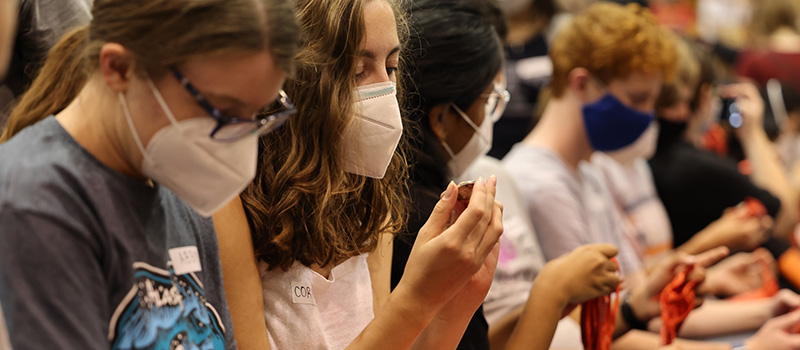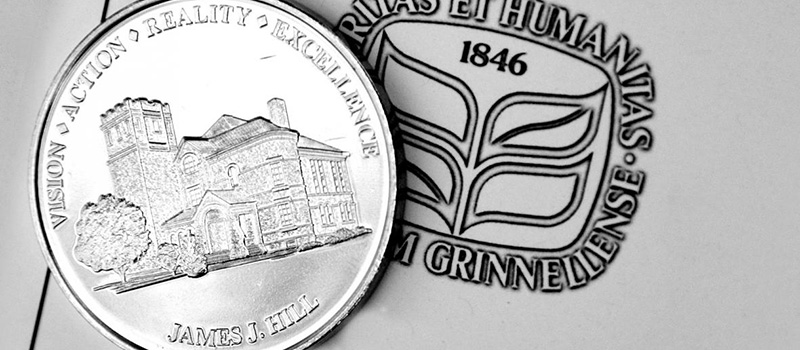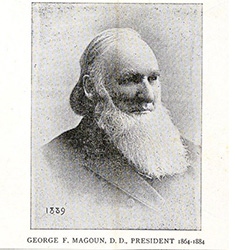Or perhaps he would want to be remembered as a close-knit family man or for writing compelling sermons.
But for all Hill accomplished in his 55 years (1815-1870), the prevailing memory of Rev. James J. Hill is from a single action that took place June 10, 1846, at a meeting of the Iowa College Congregational Association in Davenport, Iowa.
In an oft-repeated Grinnellian tale, Hill laid down a silver dollar on the table. And while accounts of exactly what was said at that precise moment vary, the message remains loud and clear 177 years later. The dollar served as a call to action to begin a tradition of giving to the school eventually known as Grinnell College.
Grinnell’s growth into a global liberal arts powerhouse, combined with a renowned endowment, combined with Hill’s own son’s efforts to make sure everyone knew who gave the first dollar, combined with a medallion made to commemorate that moment that has been given to first-year students for the past 25 years (the tradition continues tomorrow) means Hill and the silver dollar story are synonymous.
But that doesn’t mean we can’t explore more about Hill’s life and why his legacy lives on. Let’s dig in.
You may be surprised to learn Hill never lived or worked in Grinnell. He’s not an alum of the College nor did he ever teach or preach here. While he likely spent some time in Grinnell, home was always elsewhere.
The first elsewhere was Maine. He was born May 29, 1815, in Phippsburg, Maine, the 10th and final child of Mark Langdon Hill and Mary McCobb Hill. His father was a representative of Maine at the time the state was admitted to the Union in 1820, and he remained a U. S, Representative through 1823. You may recall from your middle school history class that this was the era of the Maine-Missouri Compromise, and Mark was in favor of making Maine a free state.
Mark also served as a trustee of Bowdoin College from 1821 to 1842, which predictably is where James J. attended school, graduating in 1838. [Fun fact break: of the 33 graduates in the class of 1838, 11 became educators, nine became clergymen, eight became lawyers, three became doctors, one a banker, and one a sea captain]. James went on to pursue graduate studies at Bowdoin, receiving an advanced degree in 1841.
 In this August 2022 photo, students from the class of 2026 examine the medallions they received on their first day on campus.
In this August 2022 photo, students from the class of 2026 examine the medallions they received on their first day on campus.
The next stop for the aspiring clergyman was the Andover Theological Seminary, and if you’ve been waiting in great anticipation for the Iowa Band to arrive in this story, we are at that moment.
Rather than musical talent, the Iowa Band was known for being 11 theologians, abolitionists, and philosophers who all graduated from the Andover Theological Seminary together in 1843. And instead of making, say, a donut run as their graduation pact, the Band pledged to start a college and 11 churches way out west in this territory called Iowa. Let’s introduce the band: Hill, Ephraim Adams, Harvey Adams, Ebenezer Alden Jr., Horace Hutchinson, Daniel Lane, Erastus Ripley, Alden Burrill Robbins, Williams Salter, Benjamin Adams Spaulding, and Edwin Bela “Asa” Turner.
“There is abundant evidence that the Band came to Iowa with their plans fully perfected,” wrote James Langdon Hill 1871, James J.’s son, many years later. “They had the purpose of planting a good permanent church by each working individually and of building a college by their collective labor.”
Preaching in the Midwest
Two years before Iowa became a state (and the silver dollar landed on the table), James J. Hill and his new bride, Sarah Elisabeth, 21-year-old at the time, made the trip west, settling in Clayton County in what would become northeast Iowa. They lived in what was then called Jacksonville but now is in the vicinity of Garnavillo, a small town about 7 miles from the Mississippi River.
Soon after arriving, James J. Hill wrote a lengthy letter to his brother John back in Maine. While the letter doesn’t mention the college project, it’s the only historical document where we get to hear James in his own voice. An excerpt:
“I preach in the courthouse twice a day, and three Sabbaths out of four. Some of my bearers prefer written sermons and some of them like extemporaneous discourses best, so I preach to suit the taste of both classes and preach written sermons about half the time. Most of my people have come from the East – shrewd, intelligent & men of very acute and discriminating minds. They know when they get a good sermon and how to appreciate it. I have been very much surprised sometimes in hearing them compare ministers and lawyers to hear them speak of their “style”, “attitude”, “gesture”, etc.”
 The medallions have an engraving of the oldest building on campus, Goodnow Hall, on one side along with James J. Hill’s name.
The medallions have an engraving of the oldest building on campus, Goodnow Hall, on one side along with James J. Hill’s name.
James and Sarah had at least six kids, though only two survived into adulthood, Gershom Hyde Hill 1871 and the before-mentioned James Langdon Hill. After graduation from Grinnell (still called Iowa College at the time), Gershom became a doctor and worked for many years at the State Hospital for the Insane in Independence, Iowa. James L. became a minister like his father and was awarded an honorary Doctor of Divinity by the College in 1891.
The family moved to Albany, Illinois, in 1849, but tragedy struck three years later when Sarah and their infant son, Edmund, died. 1853 saw a move to another Illinois congregation in Savannah and James’ second marriage to a Sarah (Sarah Harriman). This coupling led to six more children and at least two additional Grinnell graduates.
The eldest of the children, George Frederick, would graduate in the class of 1881. A third generation of Hill Grinnellians was cemented 28 years later by Julia Hill 1909. Julia returned to campus in 1932 where she was presented with The Iowa College Bell, which has been rung at many Grinnell College ceremonies.
Getting back to the star of our story, James J. ventured to Hutchinson, Minnesota, for two years in ministerial work before a second stint in Iowa. He served as a clergyman in Fayette from 1864-67 and became an agent of the American Missionary Association from 1867 until his passing in 1870.
No doubt about the dollar
By the time Julia Hill was in school at Grinnell, 60 years had passed since her grandfather’s silver dollar gift. With memories fading and few people from the College’s beginning still around, some doubt was being expressed as to who plopped down the infamous dollar. That clearly bugged James L. Hill. So, he went about setting the record straight, and in the process probably cemented the silver dollar story in the College’s lore.
 George Magoun
George Magoun
James L. Hill wrote a long essay called “The Gift of the Bottom Dollar” and a somewhat similar writing of his appeared in the Annals of Iowa, which was published by the Historical Department of Iowa in 1911-12. In both pieces, James L. writes about a dozen instances of people or records saying it was his dad who gave the silver dollar. He’s very convincing about it. To give you a taste, let’s hear from George Magoun, the first Grinnell College president, via a letter Magoun sent to James L.
“Your father laid upon the table of the Moderator of the Association the first silver dollar given for the college saying, ‘Mr. Moderator we have talked college long enough. It is time to give and make sacrifices for it. The time has come to act for the creation of a college in Iowa. I will make my first contribution now’ and laid a silver dollar on the table. The rest of the Association followed suit but that silver dollar of his – how your mother loved to remember it – was the first foundation in gifts for the college.”
There’s a second way the Hill family name lives on at the College thanks to James L. In 1891, he established the Hill Ensemble Scholarships, which to this day provides merit scholarships to outstanding students in vocal and/or instrumental performance.
James J. Hill’s story will once again be told tomorrow before the class of 2027 receives medallions at the New Student Orientation Welcome Ceremony.
Since its inception in 1998, first-year students have been annually given a silver medallion to commemorate Hill’s gift and symbolize the College’s collective investment and belief in them. A note accompanying the medallion states, “From a marvelous multiplicity of backgrounds, experiences and identities, you are here because Grinnell believes in you and is ready to be shaped by you: through your strength and resilience, your intelligence and empathy, your humanity and global citizenship.”
Based on what we know about James J. Hill, I have a feeling he would have liked that sentiment.
— by Jeremy Shapiro
For your information
The New Student Orientation Welcome Ceremony for the class of 2027, including the awarding of the medallions that replicate Hill’s silver dollar, will be livestreamed from 3:30-4:30 p.m. CDT Friday, Aug. 18.
To read more alumni news, check out our news archive and like the Alumni & Friends Facebook page.